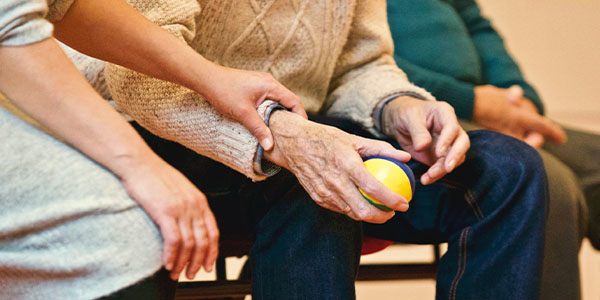Who will love and care for me?
My husband and I have been caring for our daughter with cognitive and physical challenges for nearly 30 years now. During that time, we also cared for my mother-in-law through cancer and dementia.
I’ve got to be honest, caring for people who are sick or disabled, no matter how much you love them, is hard work.
When the care is 24/7, as it is in our case, it’s downright exhausting and overwhelming. Bathing, feeding, meds, doctor’s appointments, therapies, errands – all on top of our own schedules and needs. It’s enough to make even the most loving and patient saint snap.
We have often looked around and wondered, when we become weak and vulnerable, who will care for us? Will we be able to take care of each other? Will family step in and help? Will we have the financial resources to pay for outside help? Would we want to participate in institutionalized care (programs, homes, care systems)?
In addition to our own concerns, America is experiencing a Caregiving Crisis. It’s been a problem for quite a while but was brought to the forefront during the pandemic. In her article for NextAvenue.org, Jodi M. Sturgeon, president of PHI, a nonprofit committed to improving quality care for older adults and people with disabilities, “We are facing an extraordinary demographic shift that will create new challenges for our society and demand new policy solutions. Each day, 10,000 boomers turn 65 and over the next 30 years, the population of older adults will nearly double — growing from 48 million to 88 million, with the largest percentage increase among those 85 and older. This shift all across America.” Those stats don’t even include those caring for relatively younger people struggling with chronic illness, disabilities and mental illness. From whence will our help come?

Our hope is in The Church, that the body of believers will see the need and respond in love and power as Jesus teaches us. It’s not the job of the government or institutions to care for the most vulnerable members of our families and communities. The Lord’s plan is for His people to be aware of their neighbor’s struggles and allow themselves to be moved to the point of personal sacrifice. (See Jesus’ parables of the Good Samaritan Luke 10:25-37 and The Paralytic on the Mat Luke 5:17-20.)
Jesus teaches us throughout scripture that our primary role as believers is to love and care for each other (John 13:34). We are not to just “say” we love one another, but to use our gifts and talents to care for each other – especially our family members and other believers.
Is it not to share your food with the hungry and to provide the poor wanderer with shelter—when you see the naked, to clothe them, and not to turn away from your own flesh and blood? Isaiah 58:6-7
Carry each other’s burdens, and in this way you will fulfill the law of Christ. Galatians 6:2
Each of you should use whatever gift you have received to serve others, as faithful stewards of God’s grace in its various forms. 1 Peter 4:10
Therefore, as we have opportunity, let us do good to all people, especially to those who belong to the family of believers. Galatians 6:10
Jesus teaches that we are all part of One Body, and what benefits one, benefits us all (1 Corinthians 12:26, Romans 12:4-5). As a matter of fact, when we care for one another, it is our Lord we serve (Colossians 3:24, Matthew 25:34-36).
As we look at these new challenges for our society that will profoundly impact most families, how will we, The Church, respond?
Whether you are comfortable with caring for others or just feeling the nudge from the Holy Spirit, there are many things you and your church can do. First, consider who you know that's a family caregiver and let them know you see them and the good work they're doing.

Remember, there are family caregivers taking care of children with disabilities, a spouse with cancer, an aging parent, and/or a family member affected by mental illness or addiction. Consider those caring for someone with Parkinson's, Multiple Sclerosis, ALS, Autism, Down Syndrome, and recent surgery or injury.
- Send them an encouraging note. Give them a pat or a hug and ask how they’re doing.
- Put the caregiver on your prayer list – not just the person who’s sick. Let them know they and their loved one are being prayed for.
- Offer to go to where the caregiver is (home or hospital) to simply be with them and their loved one. Don’t make them come to you. Not being afraid of the disease or disabling condition relieves the sense of isolation.
- Listen. This is as simple as a phone call or chat over a cup of tea. Listening lightens the load more than you know.
- Take food, magazines, or books that the caregiver might enjoy.
- Offer to care for their loved one for a couple of hours while they spend time away.
- Offer to escort the caregiver and their loved one to appointments. Just dropping them at the front door, helping everyone get into the office and parking and retrieving the car is a huge blessing when dealing with folks who are frail and slow and may even have equipment to manage.
- Perhaps you can commit to providing a meal (and Eucharist) once a week or once a month. Regular, dependable meals and visits offer tremendous encouragement.
- Consider a fundraiser to help with medical expenses or to purchase a costly piece of equipment.
- Start a support group for caregivers in your home, church, or community center.
- Organize a respite program.
- Ask your church to consider becoming more accessible.
Celebrated every November, National Family Caregivers Month (NFCM) is a time to recognize and honor family caregivers across the country. It offers an opportunity to raise awareness of caregiving issues, educate communities, and increase support for caregivers.
Open your eyes and your heart to family members and neighbors who are struggling with the care of a spouse with cancer, a child with disabilities, a parent with dementia and ask yourself, if it were you (or perhaps it has been), how would you want others to care for you. Then, put your empathetic and compassionate response into action, in the wonderful name of Jesus.







